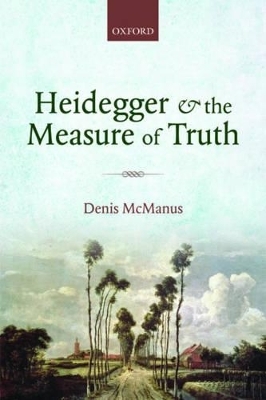
Heidegger and the Measure of Truth
Seiten
2016
Oxford University Press (Verlag)
978-0-19-874812-0 (ISBN)
Oxford University Press (Verlag)
978-0-19-874812-0 (ISBN)
Denis McManus presents a novel account of Martin Heidegger's early vision of our subjectivity and the world we inhabit. He explores key elements of Heidegger's philosophy, and argues that Heidegger's central claims identify genuine demands that must be met if we are to achieve the feat of thinking determinate thoughts about the world around us.
Denis McManus presents a new interpretation of Martin Heidegger's early vision of our subjectivity and of the world we inhabit. Heidegger's 'fundamental ontology' allows us to understand the creature that thinks as also one which acts, moves, even touches the world around it, a creature at home in the same ordinary world in which we too live our lives when outside of the philosophical closet; it also promises to free us from seemingly intractable philosophical problems, such as scepticism about the external world and other minds. But many of the concepts central to that vision are elusive; and some of the most widely accepted interpretations of Heidegger's vision harbour within themselves deep and important unclarities, while others foist upon us hopeless species of idealism. Heidegger and the Measure of Truth offers a new way of understanding that vision. Drawing on an examination of Heidegger's work throughout the 1920s, McManus takes as central to that vision the proposals that propositional thought presupposes a mastery of what might be called a 'measure', and that mastery of such a 'measure' requires a recognizably 'worldly' subject. These insights provide the basis for a novel reading of key elements of Heidegger's 'fundamental ontology', including his concept of 'Being-in-the-world', his critique of scepticism, his claim to disavow both realism and idealism, and his difficult reflections on the nature of truth, science, authenticity and philosophy itself. According to this interpretation, Heidegger's central claims identify genuine demands that we must meet if we are to achieve the feat of thinking determinate thoughts about the world around us.
Denis McManus presents a new interpretation of Martin Heidegger's early vision of our subjectivity and of the world we inhabit. Heidegger's 'fundamental ontology' allows us to understand the creature that thinks as also one which acts, moves, even touches the world around it, a creature at home in the same ordinary world in which we too live our lives when outside of the philosophical closet; it also promises to free us from seemingly intractable philosophical problems, such as scepticism about the external world and other minds. But many of the concepts central to that vision are elusive; and some of the most widely accepted interpretations of Heidegger's vision harbour within themselves deep and important unclarities, while others foist upon us hopeless species of idealism. Heidegger and the Measure of Truth offers a new way of understanding that vision. Drawing on an examination of Heidegger's work throughout the 1920s, McManus takes as central to that vision the proposals that propositional thought presupposes a mastery of what might be called a 'measure', and that mastery of such a 'measure' requires a recognizably 'worldly' subject. These insights provide the basis for a novel reading of key elements of Heidegger's 'fundamental ontology', including his concept of 'Being-in-the-world', his critique of scepticism, his claim to disavow both realism and idealism, and his difficult reflections on the nature of truth, science, authenticity and philosophy itself. According to this interpretation, Heidegger's central claims identify genuine demands that we must meet if we are to achieve the feat of thinking determinate thoughts about the world around us.
Denis McManus studied philosophy at Oxford, Cambridge, and Harvard, and is Reader in Philosophy at the University of Southampton. His research concentrates on the work of Martin Heidegger and Ludwig Wittgenstein. He is the author of The Enchantment of Words: Wittgenstein's Tractatus Logico-Philosophicus (OUP 2006) and editor of Wittgenstein and Scepticism (Routledge, 2004).
PART ONE; PART TWO; PART THREE; PART FOUR
| Erscheint lt. Verlag | 15.1.2016 |
|---|---|
| Verlagsort | Oxford |
| Sprache | englisch |
| Maße | 156 x 231 mm |
| Gewicht | 392 g |
| Themenwelt | Geisteswissenschaften ► Philosophie ► Erkenntnistheorie / Wissenschaftstheorie |
| Geisteswissenschaften ► Philosophie ► Geschichte der Philosophie | |
| Geisteswissenschaften ► Philosophie ► Metaphysik / Ontologie | |
| Geisteswissenschaften ► Philosophie ► Philosophie der Neuzeit | |
| ISBN-10 | 0-19-874812-4 / 0198748124 |
| ISBN-13 | 978-0-19-874812-0 / 9780198748120 |
| Zustand | Neuware |
| Haben Sie eine Frage zum Produkt? |
Mehr entdecken
aus dem Bereich
aus dem Bereich
die Grundlegung der modernen Philosophie
Buch | Softcover (2023)
C.H.Beck (Verlag)
18,00 €
Buch | Softcover (2023)
Reclam, Philipp (Verlag)
7,00 €

![Was heißt Denken?. Vorlesung Wintersemester 1951/52. [Was bedeutet das alles?] - Martin Heidegger](/media/113619842)
